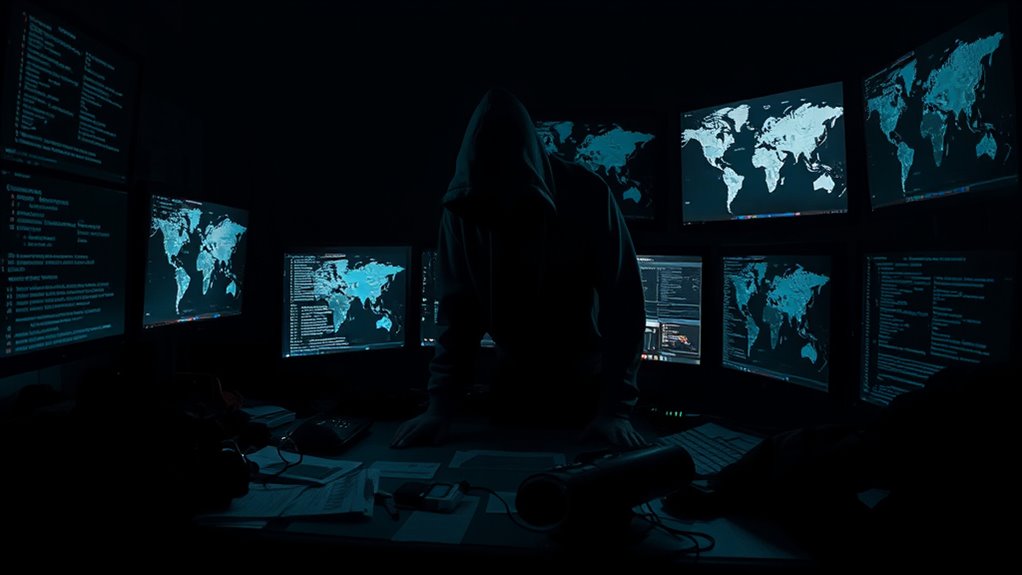The Snowden revelations in 2013 exposed the vast extent of government cyber spying, showing how agencies collect data on millions worldwide. You’ll see how this sparked global debates on privacy, ethics, and security, leading to reforms and increased scrutiny. It changed the landscape of cyber espionage, emphasizing the need for transparency and technological safeguards. Continue exploring to understand how these disclosures deeply impacted government practices and your right to privacy.
Key Takeaways
- Exposed the extensive scope of government cyber espionage, revealing surveillance on millions worldwide beyond suspected threats.
- Sparked global debates on privacy rights, leading to policy reforms and increased oversight of intelligence agencies.
- Emphasized the need for technological safeguards and privacy-preserving tools to protect individual freedoms.
- Highlighted the interconnectedness of cyber espionage and modern surveillance, fostering international cooperation.
- Challenged governments to balance national security interests with transparency, accountability, and ethical standards.

Have you ever wondered what governments are truly capable of when it comes to surveillance? When Edward Snowden leaked classified NSA documents in 2013, you got a front-row seat to a world of mass surveillance that many never knew existed. Suddenly, you realized that governments weren’t just listening to suspected terrorists or criminals; they were collecting data on millions of ordinary citizens worldwide. This mass surveillance wasn’t just about catching bad guys—it was about monitoring entire populations, tracking online activities, phone calls, emails, and even physical movements. It challenged the very notion of privacy and made you question how much of your personal life was being scrutinized without your knowledge or consent. Snowden’s revelations exposed a web of covert operations that stretched far beyond what the public believed was acceptable. They revealed that governments had built sprawling surveillance infrastructures capable of capturing vast amounts of data in real time, often operating in secrecy. The fallout was profound: it sparked global debates about privacy rights, national security, and the limits of government power. But behind the scenes, Snowden also raised a critical ethical question for whistleblowers: when is it right to leak such information? Whistleblower ethics come into focus here. Snowden believed that the public had a right to know about these invasive practices, especially when they trampled on fundamental rights. He faced a moral dilemma—whether to stay silent and continue enabling mass surveillance or to blow the whistle, risking his safety and freedom, to inform the world. His decision ignited a fierce debate about the responsibilities of whistleblowers: should they expose government misconduct at all costs? Or should they consider the potential harm their disclosures could cause? For Snowden, the ethics were clear; transparency and accountability took precedence. His actions challenged the secrecy that often shrouds government operations and questioned whether the ends justified the means. As a result, he became a symbol of resistance for those who value privacy and civil liberties. The revelations also prompted reforms and increased scrutiny of surveillance programs worldwide, forcing governments to rethink their approach to data collection and civil liberties. You’re left to ponder whether the trade-offs between security and privacy are worth it, and whether whistleblower ethics should prioritize transparency over loyalty to government institutions. These disclosures also highlighted the importance of public awareness of government surveillance, encouraging citizens to advocate for stronger privacy protections and oversight. Additionally, the revelations demonstrated the need for international cooperation and standards to effectively address global cyber espionage activities, emphasizing the interconnected nature of modern surveillance. Furthermore, the revelations underscored the significance of vetted – Grobal World in understanding the scope and scale of global cyber espionage activities, emphasizing the need for international cooperation and standards. Snowden’s disclosures changed cyber espionage forever, exposing the extent of government spying and prompting a global conversation about rights, ethics, and the power of transparency. It also underscored the importance of technological safeguards to help protect individual privacy in an increasingly interconnected world. Recognizing the scale of data collection is crucial to understanding the full impact of these programs on personal freedoms.
Frequently Asked Questions
How Has Cyber Espionage Evolved Since the Snowden Leaks?
Since the Snowden leaks, you’ve seen cyber espionage evolve markedly, driven by heightened privacy concerns and advanced surveillance tactics. Governments and hackers now use more covert methods, including encrypted communications and sophisticated malware, to gather intelligence. You’re also more aware of how data is monitored and exploited, prompting organizations to strengthen security. This shift has made cyber espionage more targeted and secretive, emphasizing the importance of safeguarding your digital privacy.
What Legal Changes Occurred After the Revelations?
Imagine a fortress that once kept secrets safe, but cracks appeared. After the Snowden leaks, you see lawmakers rushing to mend those cracks, implementing legal reforms to strengthen privacy legislation. These changes aim to protect your rights, limit surveillance, and increase transparency. You now live in a world where your privacy is more guarded, but the fight to balance security and liberty continues, shaping the future of cyber espionage laws.
How Did Public Opinion Shift Regarding Privacy?
You notice that public perception of privacy concerns shifts markedly after events like the Snowden revelations. People become more aware of government surveillance and start questioning the extent of data collection. This heightened awareness leads to increased skepticism about privacy, sparking debates on policies and data protections. As a result, you see a demand for transparency and stronger privacy rights, reflecting a more cautious attitude towards digital privacy and government oversight.
What Countries Increased Their Cyber Espionage Activities?
You might be surprised, but after 2013, nations like China, Russia, and North Korea ramped up their cyber espionage activities dramatically. They invested heavily in state-sponsored hacking, utilizing advanced espionage techniques to infiltrate global networks. These countries saw cyber espionage as a strategic tool, turning the digital battlefield into a high-stakes arena where they aggressively gather intelligence and undermine rivals, transforming the landscape of global cybersecurity forever.
How Has Cybersecurity Infrastructure Improved Post-2013?
Since 2013, cybersecurity infrastructure has strengthened markedly. You’ll notice improved privacy legislation that protects user data and enforces stricter compliance standards. Organizations also adopt advanced encryption standards, making data harder for hackers to access. These updates help you stay more secure online, reducing the risk of breaches and safeguarding your digital privacy. Overall, the focus on improved cybersecurity measures reflects a global effort to enhance data protection after the revelations.
Conclusion
As you reflect on 2013’s revelations, it’s clear they changed everything you thought you knew about cyber espionage. The secrets exposed left you wondering: what else is out there, hidden in the shadows? Will the truth keep coming to light, or will it remain buried? One thing’s certain—your world has shifted, and the stakes are higher than ever. The story isn’t over; it’s just beginning to unfold.








